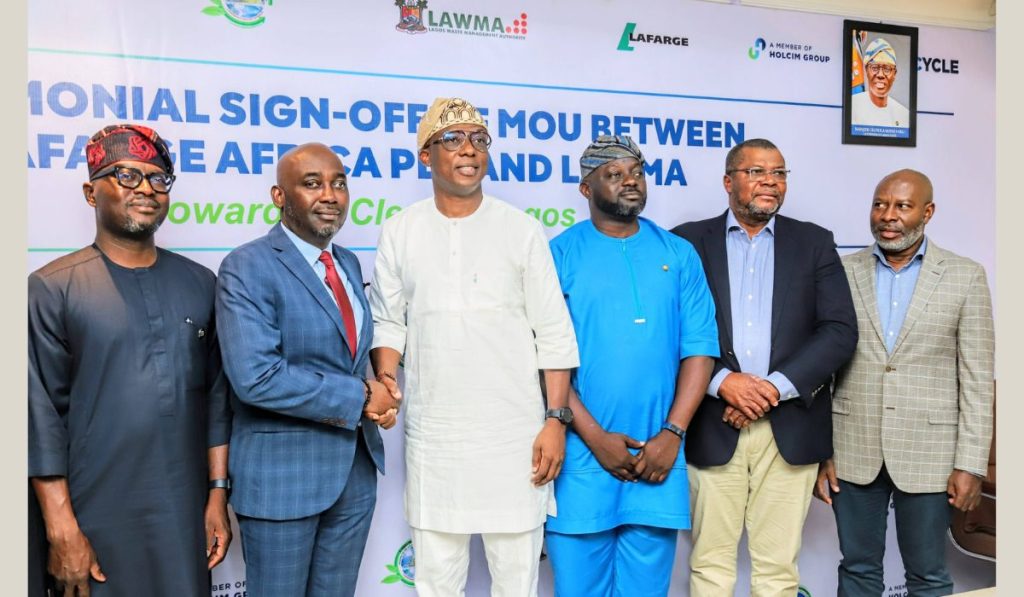
Lafarge Africa, a leading innovative and sustainable building solutions company and manufacturers of a range of cement brands, has signed a Memorandum of Understanding on solid waste management with the Lagos State Ministry of Environment and Water Resources through the Lagos State Waste Management Authority (LAWMA) in line with its ambitious zero waste to landfill objective.
Speaking during the signing ceremony held at the Ministry of Environment’s Office, Alausa Secretariat on Monday, February 17, 2025, the Chief Executive Officer, Lafarge Africa Plc, Lolu Alade-Akinyemi, described the partnership with the Lagos state government as a unique opportunity to take a significant step toward a cleaner, more sustainable future.
Alade-Akinyemi explained that with the signing of the MOU, Lafarge Africa intends to collect non-recyclable and combustible waste from companies and Lagos State dumpsites and divert it to the Ewekoro Plant as an alternative fuel for production. He added that managing waste effectively is critical to environmental stewardship, community well-being, and long-term economic development.
“By redirecting non-recyclable and combustible waste from companies and dumpsites across Lagos to our Ewekoro Plant, we are taking a significant step toward a cleaner, more sustainable future. All of these will be powered by Geocycle, our waste management arm,” he said.
Read also: LASG Launches Waste-to-Value Initiative to Drive Circular Economy and Sustainability
He noted that the partnership will strengthen Lafarge Africa’s leadership in sustainable construction and climate action and allow both parties to make meaningful contributions to sustainable waste management in Nigeria.
“We have successfully deployed waste-to-energy solutions globally, and today, we are extending that expertise to Lagos. The waste sourced through this partnership will be utilised as an alternative fuel in our cement kilns, replacing fossil fuels, reducing our carbon footprint, and contributing to Nigeria’s decarbonisation journey,” said Alade-Akinyemi
“Beyond the immediate advantages to Lagos state and Lafarge Africa, the broader environmental impact of this initiative is profound. By mitigating methane emissions from decomposing waste and reducing CO₂ emissions from traditional cement production, we take a crucial step in combating climate change,” he added.
In his remarks during the signing ceremony, Lagos State Commissioner for Environment and Water Resources Tokunbo Wahab reaffirmed the state Government’s commitment to sustainable waste management and environmental preservation. He stated that the partnership between Lagos State and Lafarge Africa represents a significant step in the state’s journey towards achieving a cleaner and more sustainable city.
“As a government, we recognise that waste management is a critical component of our environmental policies, and we remain committed to fostering innovative collaborations that will help us reduce waste, lower carbon emissions, and create a circular economy. This MoU reflects our shared vision for a Lagos where waste is effectively managed and utilised as a resource for economic growth and environmental sustainability”, he said.
Wahab disclosed that the state is aiming toward a zero-carbon footprint, stating that the MOU signing with Lafarge today ticks the box for that ambitious target. “Lagos generates between 13,000 and 15,000 tons of waste a day. That is huge. Well, we have stopped complaining. We have said to ourselves, we must address it frontally as a state. Waste management is a culture and it’s one that we must imbibe and build over time,” he added.
Also, the Managing Director of Lagos State Waste Management Authority (LAWMA), Dr. Muyiwa Gbadegesin, described the initiative as a milestone in the state’s journey toward a zero-waste future. “This partnership marks a historic step in Lagos State’s efforts to achieve sustainable waste management. We have worked closely with Lafarge Africa through extensive consultations, pilot studies, and site visits to ensure this initiative is viable and impactful. Waste management is not just about disposal; it is about innovation and creating value. With this collaboration, we are setting a new precedent in how municipal solid waste is processed and repurposed, reinforcing our vision of a circular economy where waste contributes to sustainable development rather than environmental degradation.”
[give_form id="20698"]

